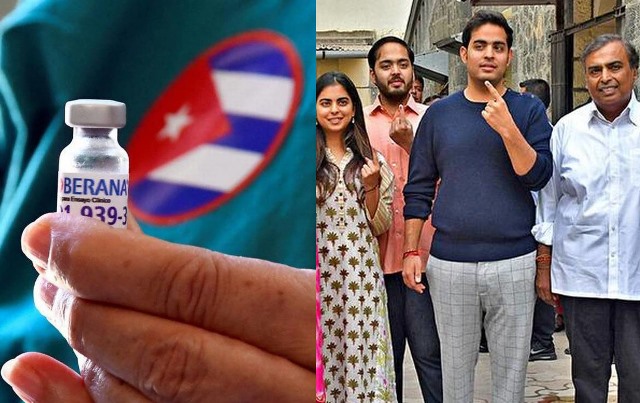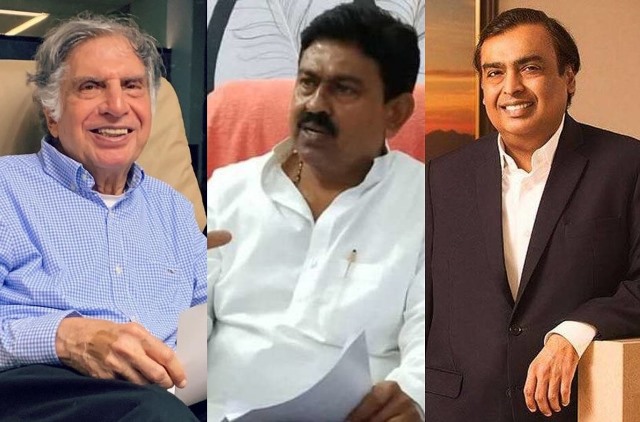Bosses of telecom giants—Reliance Jio, Bharti Airtel, and Vodafone Idea—on Saturday showed solid unity behind Prime Minister Narendra Modi’s vision of revolutionizing the telecom sector through the fifth generation (5G) technology.
Mukesh Ambani, Chairman and Managing Director of Reliance Industries Limited (RIL), Sunil Bharti Mittal, Chairman of Bharti Airtel, and Kumar Mangalam Birla, Chairman of Aditya Birla Group, joined Prime Minister Modi at the launch of 5G services.
Addressing the event, Ambani said 5G was much more than the next generation of connectivity and to his mind, “it is the foundational technology that unlocks the full potential of other 21st century technologies like artificial intelligence (AI), Internet of Things, robotics, blockchain, and the metaverse.”
“Congratulations to the country for launching a new era, and I am really grateful to the Prime Minister for inspiring all of us and giving us this digital vision,” the RIL chairman said.
Ambani thanked the prime minister for inspiring the vision of a developed nation by 2047. “Every action and policy of the government is skilfully crafted to propel India, towards that goal. Steps taken to fast-track India’s march into the 5G era provide compelling proof of our Prime Minister’s determination,” he said.
The RIL chairman narrated the possibilities of 5G in key areas like education, education, and climate. “Your leadership has raised India’s prestige, profile, and power globally like never before.” In today’s fast-changing world, there will be no stopping a resurgent India from soaring to the top, “Ambani said in the presence of Prime Minister Narendra Modi during the launch of 5G at the Pragati Maidan in the national capital.
He also said it would not be an exaggeration to say that “5G is like a digital Kamadhenu, the heavenly cow that grants whatever we desire.”
Akash Ambani, Chairman of Jio Infocomm, the digital division of Reliance Industries Limited, said Reliance Jio targets to launch 5G services across the country by the end of this year.
“Jio plans to cover entire India by December… We will make it very affordable. It should be affordable for every Indian right from device to service,” Akash Ambani, eldest son of RIL chief Mukesh Ambani,” told ANI.
Bharti Airtel chief Sunil Bharti Mittal remarked that the launch of 5G is the beginning of a new era and since it is happening during Azadi Ka Amrit Mahotsav, it makes it even more special.
“With the efforts of the Prime Minister, this will usher new energy in the country. We are fortunate to have a leader in the Prime Minister who understands technology very minutely and deployed that to the development of the country in an unmatched manner,” Mittal said.
Mittal further said that it will open up a sea of opportunities for people, especially in our rural areas. He recalled the Prime Minister’s initiatives in the field of infrastructure and technology from his Gujarat CM days.
He said that during the pandemic, traffic shifted to villages and homes and the country’s heartbeat did not stop even for a second. Credit for that goes to the digital vision. He also praised the audacity and achievement of the vision of Make in India.
“Along with Digital India, the Prime Minister also took forward the Start-up India campaign and soon enough, India started producing unicorns”, Mittal said. “With the advent of 5G, I’m sure that the country will add many more unicorns in the world,” he added.
Kumar Mangalam Birla, Chairman of Aditya Birla Group, said, “Vodafone-Idea has made a lot of preparations.” The network is compatible with converting into 5G. As the prime minister said, this is not just a new technology but a revolution. “Vodafone-Idea will make all efforts to be a part of this revolution,” Birla told ANI on the sidelines of a function for 5G services.
Aditya Birla Group is a promoter company of Vodafone Idea along with the UK-based Vodafone Group.
Prime Minister Narendra Modi launched 5G services at a function organized at Pragati Maidan in the national capital. The Prime Minister also inaugurated the sixth edition of the India Mobile Congress and also witnessed the IMC Exhibition that was put up on the occasion.
Addressing the 5G launch event, Kumar Mangalam Birla called the advent of 5G a transformational event that proves India’s prowess on the global stage and reiterates the role of telecom technology as the bedrock of India’s growth.
He thanked Prime Minister Modi for his vision and leadership for a generational leap in technology that has resulted in India making a mark on the global stage.
He also thanked the Prime Minister for his inspirational role in supporting the telecom industry during the ongoing pandemic and for the path-breaking telecom reforms in the industry.
Birla said that the launch of 5G marks the beginning of an exciting journey for India. “We will see limitless potential for 5G development and use cases in the years to come,” he added.
5G technology will offer a wide range of benefits to the common people. It will help in providing seamless coverage, high data rate, low latency, and highly reliable communications.
It will also increase energy efficiency, spectrum efficiency, and network efficiency. 5G technology will help in connecting billions of Internet of Things devices, will allow higher quality video services with mobility at high speed, and delivery of critical services such as telesurgery and autonomous cars, among others. (ANI)
Read More:http://13.232.95.176/


